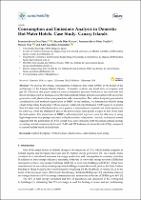Por favor, use este identificador para citar o enlazar este ítem:
https://repositorio.usj.es/handle/123456789/305
| Título : | Consumption and emissions analysis in domestic hot water hotels. Case study: Canary Islands |
| Autor: | Díaz Pérez, F. J.



Díaz Martín, Ricardo 

Trujillo, Francisco Javier Pérez 


Diaz, Moises 


Guardiola Mouhaffel, Ali Adib 

|
| Palabras clave : | Huella de carbono; DHW; Biomasa; Fotovoltaico; Solar térmica; Bomba de calor |
| Fecha de publicación: | 23-ene-2019 |
| Editorial : | MDPI AG |
| Citación : | Díaz Pérez, F.J.; Díaz Martín, R.; Pérez Trujillo, F.J.; Díaz, M.; Mouhaffel, A.G. Consumption and Emissions Analysis in Domestic Hot Water Hotels. Case Study: Canary Islands. Sustainability 2019, 11, 599. |
| Descripción : | We analyze the energy consumption of domestic hot water (DHW) in the hotels of the archipelago of the Canary Islands (Spain). Currently, systems use fossil fuels of propane and gas oil. However, this paper analyzes several alternative systems which focus on renewable and mixed energies, such as biomass, solar thermal and heat pumps systems associated with an electric generation with photovoltaic solar panels for self-consumption. The carbon footprint generated is calculated for each method of generation of DHW. In our analysis, we demonstrate that by using a high-temperature heat pump with an average coefficient of performance (COP) equal to or greater than 4.4 associated with photovoltaic solar panels, a zero-emission domestic hot water system can be achieved, when the installation area of the photovoltaic solar panels is equal to that of the solar thermal system. The importance of DHW’s carbon footprint is proven, as is the efficiency of using high-temperature heat pumps associated with photovoltaic solar panels. As such, such mixed system suggests that the generation of DHW would have zero emissions with maximum annual savings according to hotel occupancy, between 112,417 and 137,644 tons of carbon dioxide (CO2), compared to current boilers based on fossil fuels. |
| URI : | https://repositorio.usj.es/handle/123456789/305 |
| ISSN : | 20711050 |
| Aparece en las colecciones: | Artículos de revistas |
Ficheros en este ítem:
| Fichero | Descripción | Tamaño | Formato | |
|---|---|---|---|---|
| Consumption and emissions analysis in domestic hot water hotels. Case study Canary Islands.pdf | 2,11 MB | Adobe PDF |  Visualizar/Abrir |
Este ítem está sujeto a una licencia Creative Commons Licencia Creative Commons

